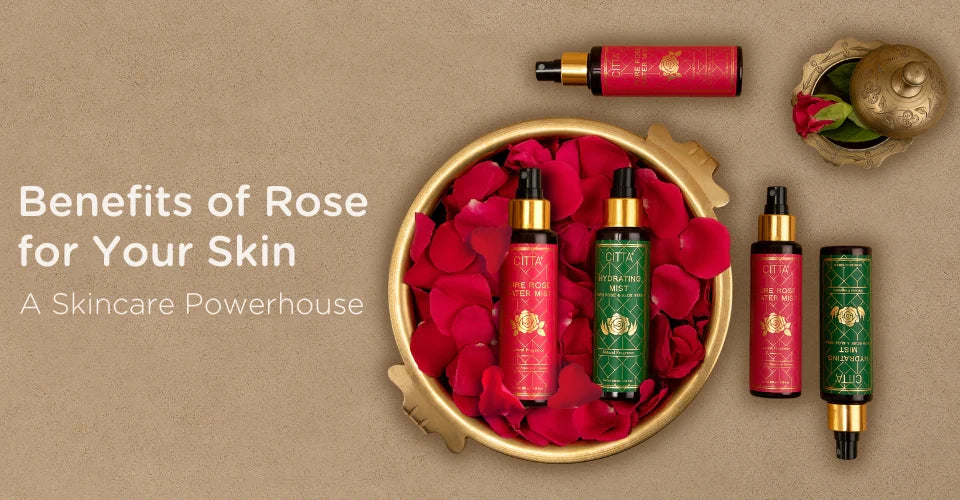Benefits of Rose Water: A Skincare Powerhouse

Few skincare ingredients are as well-known as Rose, the queen of flowers, and for good reason. The exquisite flower has been a skincare essential for ages. The Ancient Egyptians have been known to use roses to protect their skin from the harsh heat of the deserts, the Romans believed roses could keep them looking young, and the Persians found roses to have healing properties as well as a fragrance paralleled to none. Back here in India too, roses have been a part of skincare rituals for a long time. Indeed, roses are a skincare powerhouse. Read on to know what are the benefits of rose water for your face and how you can incorporate it into your skincare routine.
What are the benefits of roses for your skin?
Soothes your skin
Rose has anti-inflammatory, anti-bacterial, and antiseptic properties which help to soothe irritated skin. It can help to reduce redness and make your skin feel cool, calm, and refreshed. It can be used to soothe mild acne, razor burns, and sunburns.
Moisturizes and hydrates your skin
Rose water helps to reduce transdermal water loss from your skin, locking in moisture. It is deeply hydrating for your skin. A spray of rose water can provide a much-needed boost of moisturization to your skin throughout the day. It can be especially useful if you have excessively dry skin.
Reduces fine lines, wrinkles, and fights signs of ageing
Rose water is rich in Vitamin A and Vitamin C which are known for their anti-aging properties. The antioxidants in rose fight free radicals and undo oxidative damage. Regular use of rosewater helps to reduce the appearance of wrinkles, fine lines, pores, and acne and slows down the process of ageing, giving you a youthful appearance.
Balances skin pH and tones your skin
Rose water helps to balance your skin’s pH levels and prevents it from becoming too dry or too oily. Rose water is also a natural toner and prepares your skin for the application of other makeup products such as moisturizers and serums.
How can I incorporate Rose into my daily skincare routine?
The best way to incorporate rose into your skincare routine is by using rose water, either as a mist or as it is. Rose water is made by a process known as steam distillation. The quality of rose water depends on the quality of the roses. CITTA’s Pure Rose Water Mist is made with the finest Damask Roses handpicked from Kannauj, the renowned Perfume City of India. It is naturally fragrant and retains all the goodness of magnificent roses.
Rose water as a face mist/ face spray
Exposure to dust, dry winds, and pollution can lead to a loss of moisture in our skin. It also makes our skin look dull and lackluster. Using a rose water face mist or spray is a great way to keep your skin hydrated, fresh, and glowing all day long. CITTA’s Pure Rose Water Mist and Hydrating Mist with Rose & Aloe Vera are convenient and handy, making it easier for you to take care of your skin even with your busy schedule.
Rose water in face masks
If you regularly use face masks in your skincare regimen, you can use rosewater instead of plain water in the masks for enhanced results.
Rose water as a toner and primer
As mentioned earlier, rose has natural astringent properties which make it a great skin toner. You can either spray some rose water mist directly onto your face or spray some onto a cotton pad and dab gently onto your skin. This can help to prime your skin before makeup.
Rose water mist as a makeup setting spray
Not just before makeup, rose water can also be used post-makeup to set the makeup in place and add a necessary dose of moisturization and glow to your skin.
Also, read - The amazing benefits of aloe vera in Skincare
What are the precautions I should follow while using rose-based skincare products?
Rose water is generally considered safe for topical use. However, like with any other skincare product, you should be careful about what you put onto your skin. Always conduct a patch test before regularly using the product. Make sure that you purchase good quality rose water from a reputed vendor. You should also check the ingredient list on the product label carefully while buying the product to ensure that there are no harsh chemicals in your rosewater. CITTA’s Pure Rose Water Mist and Hydrating Mist with Rose & Aloe Vera are made with the finest quality ingredients and are free of harsh chemicals like parabens, sulphates, silicones, mineral oils, allergens, and toxins. They are formulated after stringent testing procedures to ensure quality, safety, and efficacy on all skin types.
The queen of flowers, the rose is a highly coveted skincare ingredient. Its anti-microbial, anti-inflammatory, anti-ageing, antiseptic, and hydrating properties make it suitable for a wide range of skincare applications. Whether you have dry skin or want to fight the signs of ageing, whether you want to enhance your makeup or prime your skin for it, rose water seems to be a great option for you. We hope that this article helped you understand the benefits of roses for your skin.



